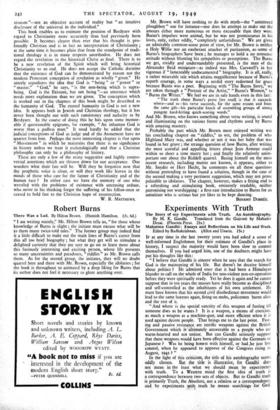Robert Burns
There Was a Lad. By Hilton Brown. (Hamish Hamilton. 12s. 6d.)
" I AM writing mainly," Mr. Hilton Brown tells us, "for those whose knowledge of Burns is slight ; the initiate must excuse what will be to them many twice-told tales." The former group may indeed find it a little difficult to make out the main lines of Burns's career from this all too brief biography ; but what they get will so stimulate a delighted curiosity that they are sure to go on to learn more about this furiously interesting and exciting person, whose life presents so many uncertainties and paradoxes, " riddles" as Mr. Brown calls them. As for the second group, the initiates, they will no doubt quarrel here and there with Mr. Brown, especially the idolators ; for the book is throughout so animated by a deep liking for Burns that its author does not feel it necessary to gloze anything over.
Mr. Brown will have nothing to do with myth—the " unlettered ploughboy " one for instance—nor does he attempt to make out the amours either more numerous or more excusable than they were. Burns's impulses were animal, but he was not promiscuous in his loves, only, rather oddly, "completely unfastidious." We are given an admirably common-sense point of view, for Mr. Brown is neither a Holy Willie nor an exuberant attacker of puritanism, as•some of Burns's biographers 'have been ; he manages to hold a no nonsense attitude without blunting his sympathies or perceptions. The Burns we get, vividly and understandably presented, is the man of the Alexander Reid miniature—as indeed was Mrs. Carswell's in her vigorous if " lamentably undocumented" biography. It is all, really, a rather miserable tale which attains magnificence because of Burns', superb courage, in some ways a sordid story redeemed for grace because Burns was a poet. Beginning with "The Burns Story," we are taken through a " Portrait of the Artist," "Burns's Women," to " Burns the Writer." We feel we are in safe hands even in this last: " The truth about Burns's prose [we read) is that it succeeds where—and as—his verse succeeds, for the same reason and from the same gift—his particular knack of assembling groups of strong pungent hard-hitting quick-scoring words."
And Mr. Brown, who knows something about verse writing, is sound and illuminating on the various forms and rhythms used by Burns with amazing mastery.
Probably the part which Mr. Brown most enjoyed writing was his concluding chapter on "riddles," to wit, the problem of who Highland Mary was, and whether or not it was her baby that was found in her grave ; the strange question of how Burns, after writing the most scornful and appalling letters about Jean Armour could within so short a time marry her ; and finally the relatively unim- portant one about the Riddell quarrel. Basing himself on the most recent research, including matter not known, it appears, either to Mr. Snyder or Herr Hecht, he comments on all these question, without pretending to have found a solution, though in the case of the second making a very pertinent suggestion, which may not prove palatable to idolators. The chapter, however, makes a fitting end to a refreshing and stimulating book, eminently readable, neither patronising nor worshipping: a first-rate introduction to Burns for an uninitiate who is serious but yet likes to be kept dancing.
BONAMY DOBREE.


































 Previous page
Previous page